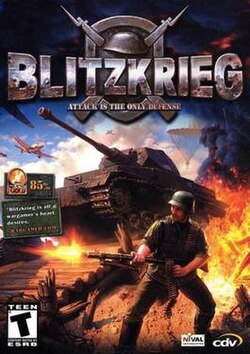Blitzkrieg (video game)
| Blitzkrieg | |
|---|---|
 | |
| Developer(s) | Nival Interactive |
| Publisher(s) | CDV Software 1C Company |
| Designer(s) | Dmitry Devishev Alexander Vinnikov Boris Yulin Igor Petukhov Serge Orlovsky |
| Engine | Enigma engine |
| Platform(s) | Windows |
| Release | June 4 2003 |
| Genre(s) | Real-time tactics |
| Mode(s) | Single player and Multiplayer |
Blitzkrieg is a real-time tactics computer game based on the events of World War II. The game allows players to assume the role of commanding officer during the battles of World War II that occurred in Europe and North Africa. Each country has its respective historically correct military units. Similar to the Sudden Strike games Blitzkrieg focuses on battles rather than real-time strategy aspects like base building.
This game, and several sequels, all use the Starforce copy protection system. Blitzkrieg Anthology does not appear to use Starforce.
Graphics deliver realistic 3-D rendered isometric terrain and details include seasons, climatic zones and weather conditions which can affect game play. Blood is present although it can be deactivated. The game features over 350 different units and objects. The player has the ability to build pontoon bridges, dig trenches, lay mines, resupply and repair units or call in air support but there are no resources apart from warehouses which can be captured present in the game. Virtually everything can be destroyed including buildings and bridges. Forests can be flattened by tanks or artillery. Each unit of a respective nation speaks its own language, adding immensely to the immersion.
The game shipped with a mission and resource editors for users to create their own units and maps.
Gameplay
Blitzkrieg centers on 3 distinctive campaigns which features some of the major factions battling it out in World War II. The 3 campaigns featured the Allies (American and British campaigns), the Germans and the Soviets. Each of these campaigns attempt to chronologically re-enact the time periods of the war by devising Chapters into each of the campaigns.
These Chapters, in turn, feature smaller scale random (i.e fictional) and historical battles. Random maps present an opportunity for the player to win upgrades for his side as depicted in the map description. Depending on the random map selected, the player may potentially bolster his forces with either artillery units or armored units.
Each player start with 'core units'. These units would be the same personnel accompanying the player throughout the chosen Campaign and may gain rank and experience as the player progresses from one Chapter to the other. The player initially starts off with 3 armored core units and 3 artillery core units and would eventually gain command of six core units of each category in later Chapters. Core units gaining rank would perform better in combat, with artillery personnel being more accurate in their shots and tank crews doing likewise.
Add ons
There are three official expansions of the original Blitzkrieg to date, all three developed by La Plata Studios (Germany), in collaboration with Nival Interactive, the developer of the original Blitzkrieg game. They are published and distributed by CDV Interactive:
- Blitzkrieg: Burning Horizon follows the footsteps of General Erwin Rommel starting from the crossing of the Ardennes to the infamous battles of the Afrika Korps and continuing to the last struggle of German resistance in occupied France.
- Blitzkrieg: Rolling Thunder traces the career of General George S. Patton during World War II ranging from the deserts of North Africa to the snowy forests of the Ardennes.
- Blitzkrieg: Green Devils [1][2], an expansion that requires Rolling Thunder in order to play.
- Stalingrad, developed by DTF Games, is a stand-alone game covering the advance toward and the battle for Stalingrad from both the German and Soviet sides.
- Talvisota: Icy Hell, developed by Blitzfront, is an add-on based on the Finnish-Russian Winter War in 1939-1940.
- The Day After, developed by G5 Software, is a stand-alone add-on which features an alternative ending of the 1962 Cuban Missile Crisis, which ends in a nuclear apocalypse and the beginning World War III.
- Mission Barbarossa and Kursk, developed by Active Gaming, follows the invasion of Soviet Union in 1941 and the Battle of Kursk in 1943.
- World War I, developed by Dark Fox, is a World War I based game built on the Blitzkreg engine. The player assumes the role of the commanding officer of either the armed forces of the United Kingdom, France, Russia, Germany or Austria-Hungary on the battlefields of the Great War with the country's respective weaponry from 1914 to 1918. As of June 2006, World War I had only been released in Russia, Poland, the Czech Republic and Australia and New Zealand.
- Blitzkrieg: Total Challenge series, developed by INtex, are expansion packs that add new units and missions.
- Blitzkrieg: Operaciya "Sever" [3], developed by Dark Fox.
Burning Horizon II
In October 2007 Hamburg-based La Plata Studios (developers of the Burning Horizon, Rolling Thunder and Green Devils titles) announced that Burning Horizon II would be released during 2008. Initial details are few and far between but, as the project is being produced in conjunction with the head of the original Blitzkrieg team, it is likely to be more than a standard expansion or stand-alone title. "...a grand, large and impressive Blitzkrieg 1 masterpiece" was how it was worded in the original La Plata announcement.
References
- Nival Interactive (2003). Blitzkrieg (PC) (1.2 ed.). CDV Software Entertaiment AG.
- Player's Manual for Blitzkrieg. CDV Software Entertaiment AG, 2003.
